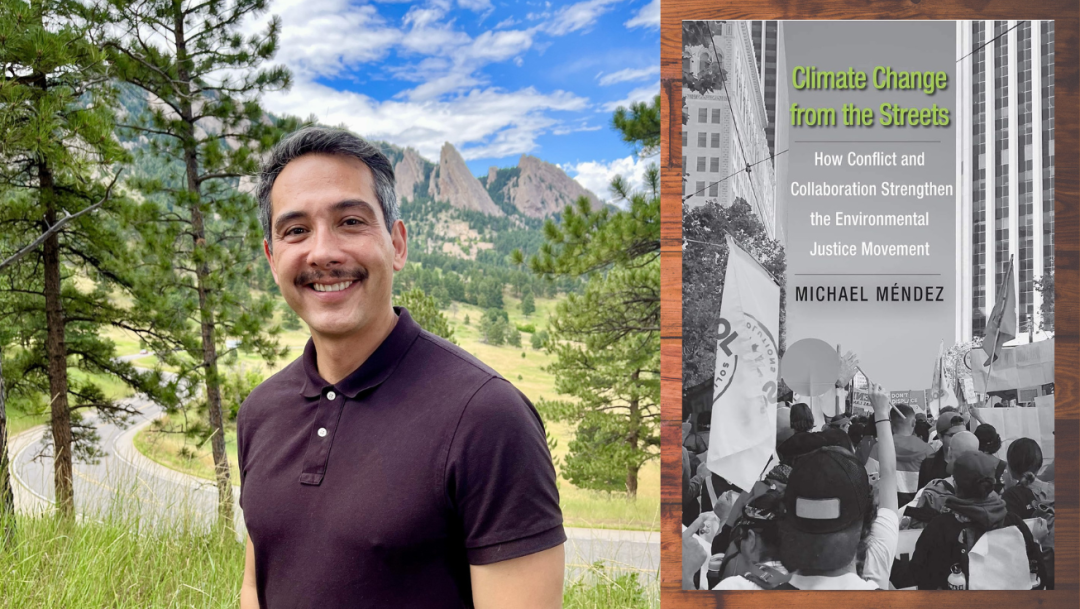
Méndez wins ACSP honor for lauded Climate Change from the Streets
Michael Méndez, assistant professor of urban planning and public policy at UC Irvine, has built his academic career focused on environmental justice and community-engaged research – working closely with populations at the frontlines of climate change inequalities. His book, Climate Change from the Streets: How Conflict and Collaboration Strengthen the Environmental Justice Movement (Yale University Press, 2020), is inspired by his experience in California’s state capitol. This included working as a senior legislative aide for then-California State Assembly member Cindy Montañez (D-San Fernando), who post-government became CEO of one of the largest locally based environmental advocacy organizations in the country, TreePeople.
At the Association of Collegiate Schools of Planning’s Annual Conference Oct. 21 in Chicago, Méndez was presented one of ACSP’s highest honors, the Paul Davidoff Book Award, which recognizes outstanding book publication regarding participatory planning and positive social change. Given every other year, the award is named after the planner, planning educator and planning theoretician who conceptualized “advocacy planning” with his wife Linda Stone Davidoff.
The same morning Méndez was presented the award, Montañez passed away. She was only 49. She had announced she’d been diagnosed with late-stage cancer in August.
Méndez honored Montañez in his award acceptance speech—just as he had done in an online ACSP questionnaire completed prior to Montanez’s death.
“I thank all the California environmental justice activists and leaders who have helped move justice to the forefront of national and international climate change policy platforms,” he wrote. “In particular, I dedicate this award to my friend, mentor, and former boss, Cindy Montañez. She recently publicly announced her battle with terminal cancer. She continues to build a strong legacy focused on environmental equity for all communities, particularly, low-income communities of color.”
Climate Change from the Streets: How Conflict and Collaboration Strengthen the Environmental Justice Movement, which previously received the Harold and Margaret Sprout Award from the International Studies Association and the Betty and Alfred McClung Lee Book Award from the Association for Humanist Sociology, amplifies the local-to-state-to-national-to-international trajectory of activism aimed at addressing the global issue of climate change.
Bill McKibben, America’s preeminent environmental author, educator and activist, gave early praise to Climate Change from the Streets, calling it, “A crucial addition to the climate change literature. Avoiding the normal view-from-on-high, Méndez gets down into the nitty-gritty of environmental justice campaigning, with all its tradeoffs, frustrations, and hard-won successes.”
Méndez says he appreciates that the Paul Davidoff Book Award will help Climate Change from the Streets and his ongoing academic work “reach a broader audience of planners, activists, and policymakers.”
“I am honored to receive this award in the field of urban planning,” he says. “Urban planning has an uneasy relationship with environmental justice. Poor planning decisions and discriminatory practices have historically heightened the burdens of environmental contamination in low-income neighborhoods and communities of color, in comparison to white, wealthy populations. The urban planning profession, however, has the capacity to help ensure that future development does not repeat the unjust environmental outcomes of the past.”
Méndez says he continues to be inspired by Montañez, who before her death was honored by the Los Angeles City Council changing the name of Pacoima Wash Natural Park to Cindy Montañez Natural Park and the California State Assembly adopting a resolution proclaiming Jan. 19 Cindy Montañez Day in California.
Montanez’s legacy is evident in Méndez’s next book project, which will “focus on the disparate impacts of climate-induced disasters, like wildfires, heatwaves, drought, and flooding on undocumented Latino/a and Indigenous communities,” the author reveals. “These are untold stories of inequality but also empowerment to change societies and our environments to be more equitable.”
— Matt Coker